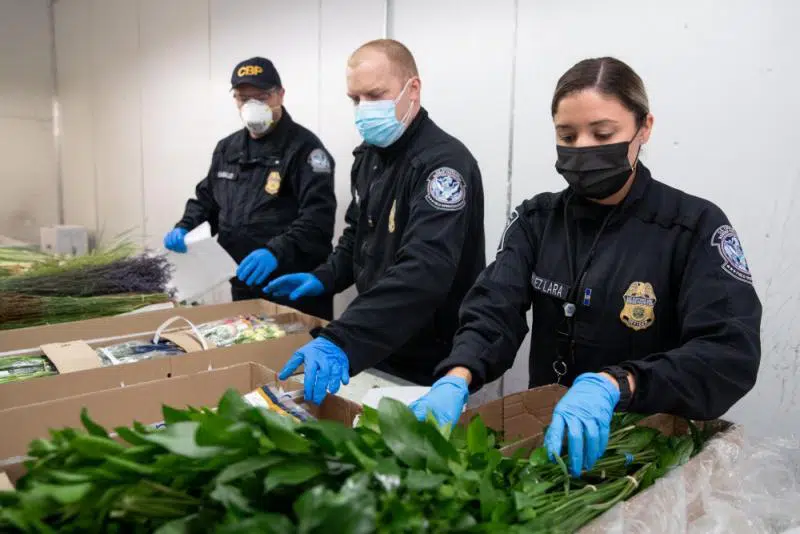Millions of pounds of fresh fruits, vegetables, cut flowers, herbs, and other items enter the United States via
While these items seem harmless, there could be hidden threats in that luggage and in those trucks, trains and containers of fresh goods that could seriously threaten U.S. agriculture, our natural resources and our economy.
The CBP agriculture specialist and CBP officer at U.S. ports of entry and international mail facilities look for, detect, intercept, and thereby prevent the entry of these potential threats before they have a chance to do any damage.
Cada año, los especialistas en agricultura de la CBP interceptan decenas de miles de «plagas procesables», es decir, aquellas identificadas a través de evaluaciones y estudios científicos de riesgo como peligrosas para la salud y la seguridad de los recursos agrícolas de Estados Unidos.
They check containers and trucks for smuggled agricultural products or packaging materials that may contain invasive species that could harm our agriculture and environment.
Examinan los paléts de madera que podrían ocultar las larvas de insectos perforadores de la madera dispuestos a atacar los árboles autóctonos o el material de vivero.
Se aseguran de que las frutas y verduras importadas estén libres de plagas.
Los especialistas en agricultura del CBP trabajan con máquinas de rayos X especializadas que detectan materiales orgánicos. Utilizan caninos agrícolas específicamente entrenados para olfatear carne y materiales vegetales en las zonas de pasajeros de los aeropuertos internacionales.
Agroterrorismo
Unfortunately, our post 9/11 world includes a new and dangerous threat. This threat is agroterrorism. Agroterrorism is terrorism directed at some component of agriculture or the food supply. Examples include the intentional introduction of a plant or animal pest or disease or the contamination of food materials with a toxic substance. Agricultural inspections have traditionally focused on the unintentional introduction of pests or diseases, i.e., those that go unnoticed in someone's luggage or hitch a ride on the walls of a container. Now we need to focus on the deliberate introduction of these threats as well.
With the added danger of agri-terrorism, the role of CBP agriculture specialists at our ports of entry is more crucial than ever.
Travel and world trade
One in five foods is now imported. We can now have fresh strawberries when it's 20 degrees below zero. U.S. consumers demand fresh limes and blueberries year-round. In fact, during the winter months in the U.S., nearly 80% of the fresh fruits and vegetables that reach our tables come from other countries.
With increased trade, new pest pathways are being discovered and agricultural risks to the United States are increasing. The threat to crops and livestock is real.
Request more information here



